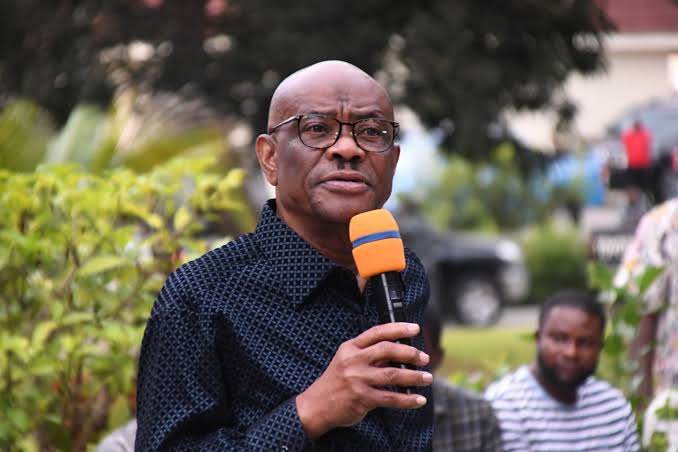The incident in Port Harcourt, where a group of women loyal to the suspended Rivers State Governor, Siminalayi Fubara, staged a walkout during an empowerment program hosted by the First Lady, Senator Oluremi Tinubu, has sparked a strong condemnation from the Minister of the Federal Capital Territory, Nyesom Wike. Wike, who is currently in China on official business, labeled the women’s actions a “show of shame” and an embarrassment to the people of Rivers State. He issued a public apology to both President Bola Tinubu and the First Lady on behalf of the state, distancing himself and his supporters from the disrespectful display. The event, organized under the Renewed Hope Initiative, was intended to empower 500 women across the state, but was marred by the abrupt departure of the Fubara loyalists. Reports suggest that the women, led by several dismissed local government vice-chairmen, walked out after allegedly being sidelined and replaced on the program’s list by individuals aligned with Wike.
The core of the controversy lies in the apparent power struggle between Wike and Fubara. Wike, the former governor of Rivers State, has openly accused Fubara of orchestrating the walkout, alleging that it was a deliberate attempt to disrespect the President and First Lady. He questioned Fubara’s sincerity in his calls for peace, pointing out the contradiction between his words and actions. According to Wike, Fubara’s pleas for reconciliation are undermined by his simultaneous sponsorship of actions that create discord and insult key figures, including the nation’s leaders. This incident underscores the deep-seated political rift between the two factions within the state, with the empowerment program becoming the latest battleground in their ongoing feud.
Wike’s statement, released through his Senior Special Assistant on Public Communication and Social Media, Lere Olayinka, strongly condemned the walkout as a direct affront to the offices of the President and the First Lady. He emphasized the importance of respecting these high offices, regardless of political affiliation, and expressed regret over the negative impression the incident might create about the people of Rivers State. Wike reiterated his commitment, and that of his followers, to peaceful coexistence and respect for constituted authority, seeking to differentiate their stance from the disruptive behavior exhibited by the Fubara loyalists. He highlighted the irony of Fubara’s calls for peace while simultaneously engaging in actions that fuel division and animosity.
The empowerment program, intended to benefit women in Rivers State, became a casualty of the ongoing political tensions. The walkout not only disrupted the event but also overshadowed the intended positive impact of the initiative. The First Lady’s efforts to empower women were unfortunately sidetracked by the political drama unfolding between the warring factions. The incident raises concerns about the politicization of development programs and the potential for political rivalries to undermine initiatives designed to uplift vulnerable populations. The focus shifted from the empowerment of women to the political maneuvering and power plays within the state, highlighting the detrimental effects of political conflict on development efforts.
Wike, in his statement, challenged Fubara to be transparent about his intentions and to directly communicate his grievances to President Tinubu. He argued that genuine peace requires honesty and open communication, rather than veiled actions and symbolic protests. He suggested that Fubara’s alleged behind-the-scenes maneuvering and indirect attacks are counterproductive to achieving lasting peace within the state. Wike called for a more direct and honest approach to conflict resolution, urging Fubara to engage in constructive dialogue with the President rather than resorting to disruptive tactics. This, according to Wike, would demonstrate a genuine commitment to peace and reconciliation.
The incident has further exposed the fragile political landscape in Rivers State and the underlying power struggle between Wike and Fubara. The walkout, ostensibly a protest against alleged marginalization, became a symbol of the deeper political divisions and the ongoing battle for control within the state. The empowerment program, meant to be a platform for uplifting women, was inadvertently transformed into a stage for political posturing and a demonstration of power. The incident serves as a reminder of the pervasive nature of political conflict and its potential to disrupt even well-intentioned initiatives aimed at community development and empowerment. The women caught in the crossfire of this political drama represent the unintended casualties of this ongoing power struggle.














